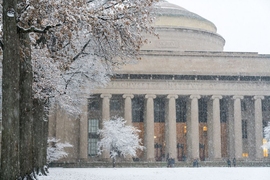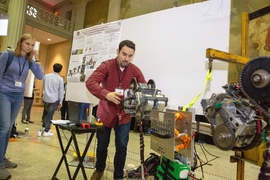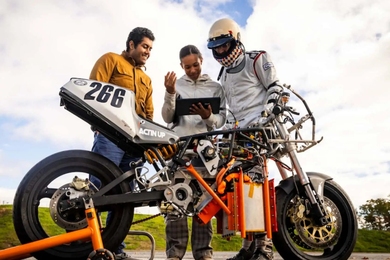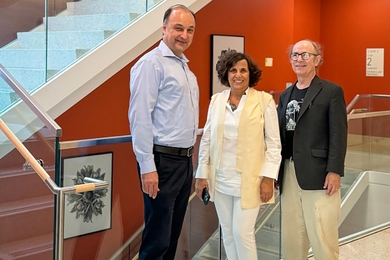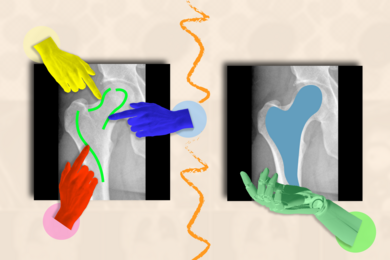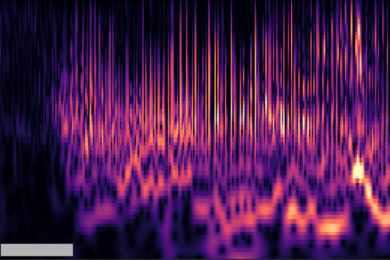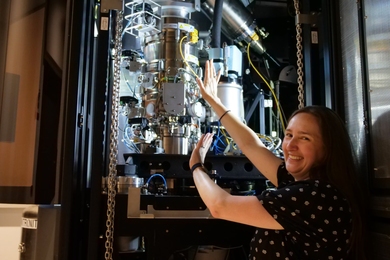Youssef Marzouk and Nicolas Hadjiconstantinou have been named co-directors of MIT’s Center for Computational Engineering (CCE), effective immediately, Anantha Chandrakasan, dean of the School of Engineering, has announced.
“This is an exciting time for computation at MIT, and I’m delighted they have agreed to serve in this important role,” Chadarkasan says. “The CCE has become a hub for some of the most advanced thinking on the science and engineering of computation. Professor Marzouk and Professor Hadjiconstantinou’s deep connections to this community and its pioneering educational programs will make them important partners in our plans for the future.”
An associate professor in the Department of Aeronautics and Astronautics, Marzouk is also the director of MIT’s Aerospace Computational Design Laboratory and has served as co-director of graduate educational programs for the CCE. He is also a core member of the Statistics and Data Science Center in MIT's Institute for Data, Systems, and Society. His research focuses on uncertainty quantification, inverse problems, statistical inference, and large-scale Bayesian computation for complex physical systems, and on using these approaches to address modeling challenges in energy conversion and environmental applications.
Marzouk received his BS, MS, and PhD degrees in mechanical engineering at the Institute, and spent several years at Sandia National Laboratories before joining the faculty in 2009. He is a recipient of the Hertz Foundation doctoral thesis prize, the Sandia Laboratories Truman Fellowship, the U.S. Department of Energy Early Career Research Award, and the Junior Bose Award for Teaching Excellence from the MIT School of Engineering.
Hadjiconstantinou is a professor in the Department of Mechanical Engineering and co-director for the CCE’s Computation for Design and Optimization program, as well as its computational science and engineering PhD program. His research interests include kinetic transport for small-scale fluid flow and solid-state heat transfer applications, molecular and stochastic simulation of nanoscale transport phenomena, and molecular and multiscale simulation method development. His research group uses theoretical molecular mechanics approaches, as well as molecular simulation techniques, to develop better understanding, as well as reliable models of nanoscale transport.
Hadjiconstantinou received a BA and MA in engineering from the University of Cambridge, and MS's in both mechanical engineering and physics from MIT, where he also earned his PhD in mechanical engineering. He is a former Lawrence Livermore Fellow and was awarded the Gustus L. Larson Award from the American Society of Mechanical Engineers.
The Center for Computational Engineering was launched in 2008 and serves as a focal point for research and education in computational science and engineering at MIT. The center has its roots in the Computation for Design and Optimization (CDO) master’s degree program, which first started in 2005. CDO was incorporated into CCE when it was established, and in 2013 the center established a PhD program in computational science and engineering.
The center now comprises faculty and research partners from across the Institute. Its work focuses on advancing computational methodologies for scientific discovery and technological innovation across a spectrum of societally important application areas.
The CCE’s education programs are, by construction, interdisciplinary. Students in the center’s doctoral program, for example, satisfy departmental requirements with participating partner departments (currently Aeronautics and Astronautics, Civil and Environmental Engineering, Chemical Engineering, Mechanical Engineering, Nuclear Science and Engineering, and Mathematics), but with enhancements that reflect an emphasis on computational engineering. This with-departments curricular structure is already serving as a model for other interdisciplinary doctoral programs at MIT, such as the PhD program in statistics administered within IDSS.
Marzouk and Hadjiconstantinou replace Anthony Patera, the Ford Foundation Professor of Engineering in the Department of Mechanical Engineering, and Karen Willcox, a former MIT professor of aeronautics and astronautics.

